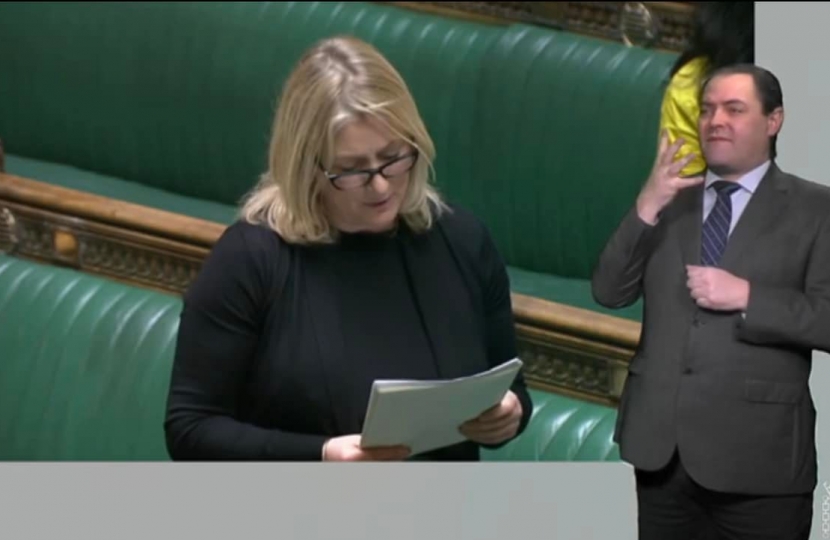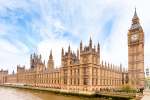
I am delighted that the British Sign Language Bill has passed Second Reading. Along with MPs from all parties, I spoke in support of the Bill in the debate last week:
It is an absolute pleasure to follow my hon. Friend Chris Clarkson, whose eloquent speech was absolutely joyous. I was touched by the deeply moving speech by Rosie Cooper. I loved her moving stories about her hero dad, the courage of her mother, and her support for her mother.
As the hon. Lady said, today is a momentous day, and I am absolutely delighted to support her Bill, which will have a transformational impact for more than 150,000 deaf people in the UK who use British Sign Language. She should be incredibly proud of having introduced the Bill. I agree with her that we should seize this moment and ensure the Bill’s safe passage. I have been contacted by constituents about this issue, and I know that the passage of the Bill is as important to them as it is to me.
By granting BSL the same legal recognition and associated protections as the current six protected languages in the UK, the Bill will ensure that deaf people are afforded equal status with everyone else. That can only be a good thing and it is the right thing. The creation of a British Sign Language council is a vital component of the Bill that will have a significant positive impact in promoting and protecting the use of British Sign Language. It is important that that council is inclusive and representative, which is why I welcome the Bill’s proposal that it should be comprised of a majority of deaf signers. It is imperative that any guidance be created in direct consultation with the deaf community.
Many years ago, I did lots of voluntary work with a group called Birmingham PHAB Camps, a charity for both physically handicapped and able-bodied children, and we used to go to a variety of facilities during amazing one-week holidays. I was shocked that at the end of the holidays, I was asked how we should change the facilities so that those with disabilities would have better holidays. They should not have been asking me; they should have asked the people with disabilities. That is why the Bill’s proposal for an inclusive and representative British Sign Language council is so important. It is about asking the right people what they want and how we need to deliver it—they are the ones with the right answers.
BSL is the preferred language of more than 87,000 deaf people in the UK, which is why it is so important that it is made an official British language going forward. As others have mentioned, if the amazing Rose Ayling-Ellis of “EastEnders” and “Strictly Come Dancing” has taught us anything, it is that BSL is an expressive and absolutely beautiful language. We have all seen it every Saturday night on “Strictly”—it seems my hon. Friend Jane Hunt has seen every show in—I suspect—every single series since its conception. Long may that continue.
BSL is distinctive, and it utilises grammar, handshapes, facial expressions, gestures and body language to convey meaning. To some extent, it is more beautiful than how we speak. That was demonstrated every Saturday when we watched the beautiful Rose do her most amazing dances, and particularly when the music stopped. We did not need music; it was just absolutely compelling.
BSL was recognised as an official language by the UK Government on 18 March 2003, but it does not have the legal status of languages that have been accorded protected language status. That is bizarre, and I do not know why it has taken so long, but I am grateful to the Minister for acknowledging that the measures will go forward.
I welcome the Bill’s requirement for the Secretary of State to issue guidance to ensure that BSL is accommodated in the responsibilities of Government Departments and public bodies. It is important that they are accountable for the actions they take to promote the use of BSL. That is why the Bill’s inclusion of a requirement for Ministers to report on their use and facilitation of BSL is so important.
The Bill builds on the public sector equality duty and existing equalities legislation in establishing a level playing field for the deaf community. I am proud of the progress this country has made. Throughout the pandemic, public health information and Downing Street press briefings have been made available in BSL, and I am pleased that the Cabinet Office is currently working to extend similar provisions to all future broadcasts from No. 10.
There are at least 50,000 deaf children in the UK and there has been tremendous progress in promoting and facilitating the use of BSL in schools. Many schools teach it in their curriculums, and I welcome the Department for Education’s work to introduce a GCSE—I was going to say O-level—in BSL as soon as possible. I know the Government aim to consult the public on the draft content of the qualifications this year, and I encourage people in my Stourbridge constituency to take part.
Beyond early education, there has been substantial progress in supporting adult learners after leaving school. The adult education budget and the advanced learner loan provide funding for people aged 19 and over to obtain qualifications in British Sign Language. With Government funding, the National Deaf Children’s Society has developed the “I-sign” sign language programme for families to learn BSL. It is an incredible free resource, and I urge people to take full advantage. I note that some of the hon. Members present have probably been using that service to learn some of their signing, and I think we are all keen to follow up on that and do more, so that we can go out to our constituents and use BSL. It is so important.
I welcome the Government’s commitment to reviewing the access to work scheme. It is vital that deaf people receive equal education and employment opportunities, which is why the review will ensure that Government-funded workplace adjustments enable BSL users to receive the support they need. My hon. Friend the Member for Heywood and Middleton mentioned people potentially feeling isolated and that they are in a minority, which is why it is so important that those going into a work situation can feel confident that it is an inclusive environment. I think that is what he was alluding to, and we need that inclusivity.
We are making progress on Government policy. I have mentioned the sign interpretation when we do covid announcements on television and the move on future announcements from Downing Street, but the provision for BSL users to access services is covered by equalities legislation and the public sector equality duty. Employers, service providers and public bodies must provide services in BSL when it is reasonable to do so. I have mentioned the Cabinet Office, but organisations such as the Equality and Human Rights Commission have suggested we should go further, for example by including a live BSL interpreter on set.
Schools can choose to offer sign language in their curriculum, as I have already mentioned, and include it as part of their extracurricular activities programme. I will be going around to my schools and having those conversations to ensure that that does take place. BSL forms part of the non-statutory local flexibility offer and qualifications are either fully funded if the learner is unemployed or participating in the low wage trial, or co-funded depending on the age, prior achievement and employment status of the learner. BSL qualifications at level 3 and above can be funded through an advanced learner loan, which is brilliant to hear, and the Government have funded the development of a family sign language programme. I am told it is freely available at the National Deaf Children’s Society family sign language website, for those who are listening.
There have also been recent parliamentary initiatives: the Deaf Awareness Week in 2021 and an early-day motion calling on the Government to introduce legislation giving legal status to British Sign Language, which received about 50 signatures. There is growing momentum behind this issue, which I very much hope will conclude today. Another motion on teaching of BSL in schools was tabled in September 2020 and has gained significant ground. There have been many people supporting this Bill: the British Deaf Association, the Royal Institute for Deaf People and of course Rose Ayling-Ellis, the winner of “Strictly Come Dancing”, who commented:
“BSL is not an official language, legally, in this country. Which is outrageous. Because it is such a beautiful, rich language with its own structure, its own grammar, its own slang. It’s even got accents.”
I feel that it is important to recognise the role that charities have played in supporting the deaf community. Deafscope in Stourbridge is a fantastic local organisation that provides a directory of deaf-friendly and deaf-owned businesses. It is brilliant. It improves accessibility for deaf people and gives deaf-friendly and deaf-owned businesses a platform to promote their services. That local success story was created by a deaf couple, Kerry and Ishtiaq Hussain, and is shaped by their personal experiences of isolation and loneliness growing up deaf. Their innovative company has had a tremendous impact on the deaf community, helping to combat feelings of exclusion by connecting deaf people to inclusive opportunities.
I know that the Bill will be welcomed by Deafscope, as it has been by other deaf-led organisations. Significant progress has been made in recent years in promoting and facilitating the use of British Sign Language, spurred on by brilliant grassroots organisations such as Deafscope. However, there is still much more for us to do, and the Bill is a big step forward in enabling us to do that.
The Bill will ensure that British Sign Language and its users finally have legal parity. I thank the hon. Member for West Lancashire so much for bringing it to the House—I know that everyone else here does, too—and I thank the Minister for supporting it. My hon. Friend Virginia Crosbie and Lilian Greenwood spoke about the importance of inclusivity and accessibility in society. That is so important. I talked about it in my maiden speech, and it is something that I very much want to work on. If there is anything I can do to support work with BSL to improve inclusiveness, I am more than happy to help. [In British Sign Language: “Thank you.”]

